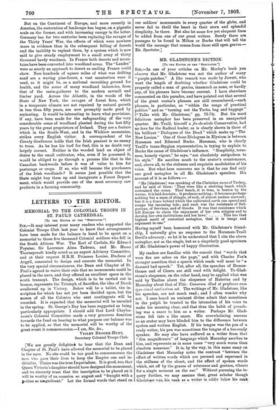LETTERS TO THE EDITOR.
MEMORIAL TO THE COLONIAL TROOPS IN ST. PAUL'S CATHEDRAL.
rro THE EDITOR OP THE "SPECTATOR...1 Sin,—It may interest your many readers who supported the Colonial Troops Club last year to know that arrangements have been made for the balance in hand to be spent on a memorial to those five thousand Colonial soldiers who fell in the .South African War. The Earl of Carlisle, Sir Edward Poynter, Sir Laurence Alma Tadema, and Mr. Hamo Thorneycroft kindly acted as an expert Advisory Committee, and at their request H.R.H. Princess Louise, Duchess of Argyll, consented to design and execute the memorial. In the very special circumstances, the Dean and Chapter of St. Paul's agreed to waive their rule that no monuments could be placed in the nave, and they offered an excellent space in the south transept. The design, which is to be carried out in bronze, represents the Triumph of Sacrifice, the idea of Death swallowed up in Victory. Below will be a tablet, the in- scription for which has not yet been decided upon, but the names of all the Colonies who sent contingents will be recorded. It is expected that the memorial will be unveiled in the spring. St. George's Day has been suggested as being particularly appropriate. I should add that Lord Cheyles- more's Colonial Committee made a very generous donation towards the fund on hearing to what purpose our balance was to be applied, so that the memorial will be worthy of the great event it commemorates.—I am, Sir, Ste.,
VIOLET BROOKE-HUNT, Secretary Colonial Troops Club.
[We are greatly delighteal to hear that the Dean and Chapter of St. Pries have allowed the memorial to be placed in the nave. No site could be too good to commemorate the men who gave their lives to keep the Empire one and in- divisible. Theirs was the true Imperialism. It is good, too, that Queen Victoria's daughter Should have designed the monument, and we sincerely trust that the inscription to be placed on it will be worthy of an occasion so august and "fraught with a plthos so magizificent." Let the formal words that stand on our soldiers' monuments in every quarter of the globe, and never fail to thrill the heart in their stern and splendid simplicity, be there. But also let some few yet eloquent lines be added from one of our great writers. Surely there are passages to be found in Milton or Burke that will tell the world the message that comes from these still open graves.— En. Spectator.]






























































 Previous page
Previous page